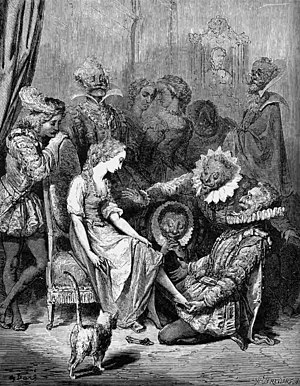I made it through the essay part of the exam (the objective part is tomorrow), and I think that I did okay, but today I want to talk about fairy tales. I can't believe I never heard of The Storyteller before. I rented it, but now it's on my wish list. I watched it with my brother, the Rossmonster. Ross is seven (yeah, and I'm 18. I know! What were they thinking?), and he liked Hans My Hedgehog best. I actually got 10 extra credit points thanks to Ross (I knew he had to be good for something). I read him the Brothers Grimm version of Cinderella and wrote a page about how he reacted. It was pretty funny. He said that he liked it much better than the Disney movie, and he wanted to know why the movie didn't have the stepsisters getting their eyes pecked out. Yeah, that would have worked.
Anyway, I'm taking a psych class in childhood development over the summer, and I think I might use fairy tales for my research paper. We'll see. For now, back to studying.
The final exam essay question seems harder already: we have to analyze the fairy tale (it's called The Three Ravens, and we won't see the video until Wednesday!) using a critical model (Toffee is absolutely obsessed with critical models) from the handout she gave us last week. The handout is a short reading by Bruno Bettelheim, who apparently was a very controversial guy. I get most of what he's saying, I think, but without knowing The Three Ravens, I'm not sure what I can apply to the story. She showed us Hans My Hedgehog (it's kind of a Beauty-and-the-Beast story) yesterday, which was pretty weird, and I figured out a few things from the handout that could apply to that.
For one thing, Hans's father doesn't love him, which is why Hans leaves home. I can see where a kid whose father is kind of cold might get some help from the story, since we find out that the father realizes he cares about his son after he leaves AND since Hans does live happily ever after in the end. The story also shows that you have to keep trying if you ever want to be happy, which is something that is mentioned in the handout. There is one thing that I wish the model did explain, which is why Hans has a horse-sized rooster that he can saddle up and ride! No help there.
It is interesting, to look at fairy tales this way, I mean, and I can see where they can give kids a way to think about stuff that bothers them. It just never occurred to me that the stories had a purpose.
The article below has a really good discussion of kids and fairy tales (and it talks about Bettelheim, too).
The final exam is coming up in another week, and there is going to be an essay question about fairy tales. Dr. Toffee wants us to write about how we take exams, stuff like how we pick essay questions when we have a choice. Well, obviously, I pick based on whether I can think of something to write about the topic of the question, but sometimes that turns out badly anyway. Usually, I try to figure out what the teacher wants to hear, based on what was said in class about the topic, and I try to get as much in as I can. I don't know if that's going to work this time, because we are going to analyze a fairy tale for the exam.
One good thing-- she's going to give us a study guide, and it will have the essay question on it. That way, I can deal with figuring it out ahead of time. I hate having to ask for an explanation during an exam (even though I'm pretty sure that everybody else needs one and feels the same way).
I never thought much about how teachers make up exam questions, but the article below makes it seem really complicated.
 Image via Wikipedia
Image via Wikipedia Image via Wikipedia
Image via Wikipedia Image via Wikipedia
Image via Wikipedia Image via Wikipedia
Image via Wikipedia